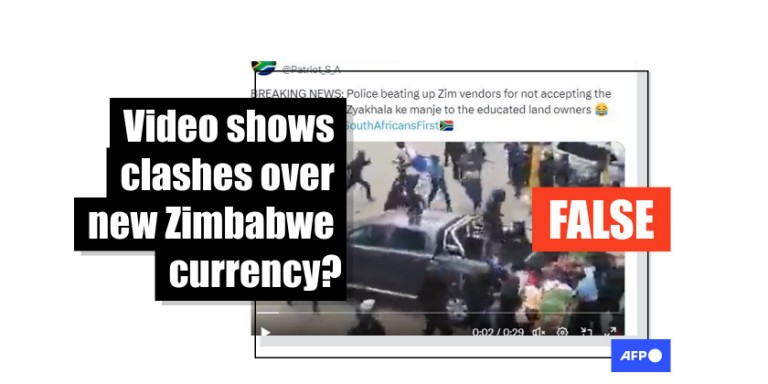
Posts falsely claim video shows crackdown by Zimbabwean police over new currency
- This article is more than one year old.
- Published on April 26, 2024 at 18:02
- 4 min read
- By Tendai DUBE, AFP South Africa
In the 30-second video, anti-riot police wielding batons chase and beat people in the street.
“BREAKING NEWS: Police beating up Zim vendors for not accepting the new currency ZiG. Zyakhala ke manje to the educated land owners #Abahambe #PutSouthAfricansFirst,” reads an X post published on April 23, 2024.
The new currency, called ZiG, is short for Zimbabwe Gold.
“Zyakhala ke manje” translates from isiZulu to “they are crying now” and land owners refers sarcastically to Zimbabwe’s infamous land grabs of white farms under former president Robert Mugabe.
Also in isiZulu, “Abahambe” means “they must go”.
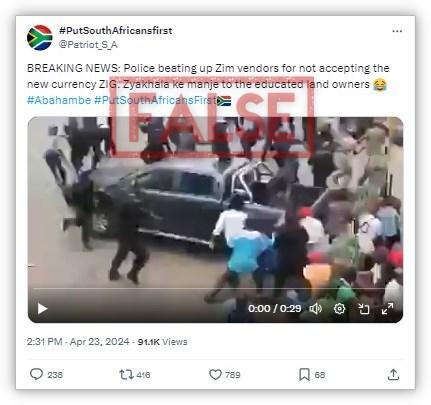
Similar posts were published here and here on X with the same video.
Some users in the comments said the video was old while others used it to spew anti-migrant sentiments on accounts based in South Africa, where Zimbabweans and other foreigners are subjected to abuse on social media.
The video, however, is from 2019 and unrelated to the ZiG.
Elections 2019
The footage was the subject of two AFP Fact Check debunks: in 2020 when it was falsely claimed it showed a police crackdown on churchgoers who defied the Covid-19 lockdown regulations, and again in 2023 ahead of last year’s elections.
Keyword searches on Google revealed the video had been shared by journalists and lawyers on November 20, 2019 (archived here and here).
One of the posts read: “Video received: Zimbabwe riot police attacked opposition party MDC Alliance supporters today who had gathered to hear leader, Nelson Chamisa, give his Hope of the Nation Address.”
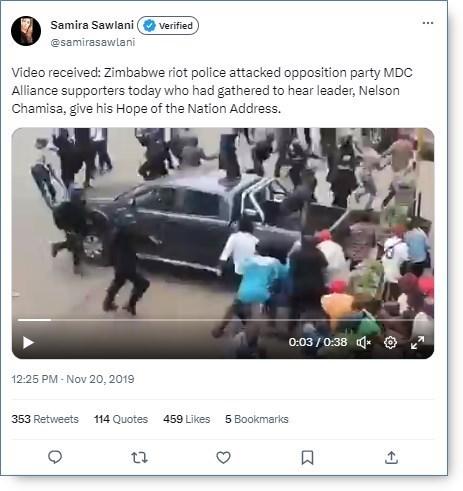
The Movement for Democratic Change (MDC) Alliance, the main opposition party at the time, was later renamed Citizens Coalition for Change (CCC) (archived here).
AFP photographer Jekesai Njikizana was on the scene when the events unfolded in 2019. In one of his images, a man in red overalls with a matching red backpack stands out amid the police contingent. He also appears in the video currently being shared.

Njikizana’s photograph is captioned: “An anti-riot policeman in Zimbabwe tackles a woman with his boot as they dispersed a crowd gathered to hear an address by leader of the MDC (Movement for Democratic Change) Alliance, Nelson Chamisa at Morgan Tsvangirai House, the party headquarters, in Harare, on November 20, 2019. Nelson Chamisa was due to address party supporters in his Hope of the Nation Address (HONA). The public address was blocked by riot police who beat up several people as they dispersed.”
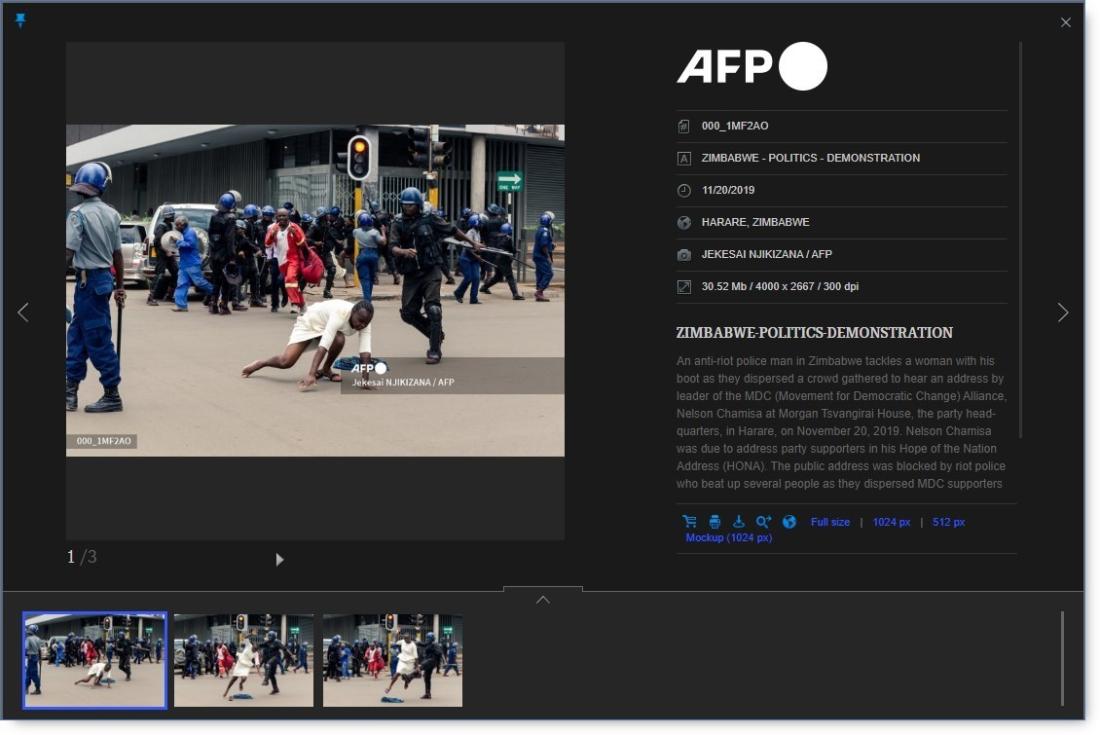
President Emmerson Mnangagwa of the ruling Zimbabwe African National Union–Patriotic Front (Zanu-PF) won the 2018 elections, an outcome marred by fraud allegations (archived here).
Zimbabwe Gold
As reported by AFP, the ZiG got off to a chaotic start the week it was launched because banks and shops needed more time to transition to the new currency (archived here).
This is the country’s fifth attempt at creating a local currency.
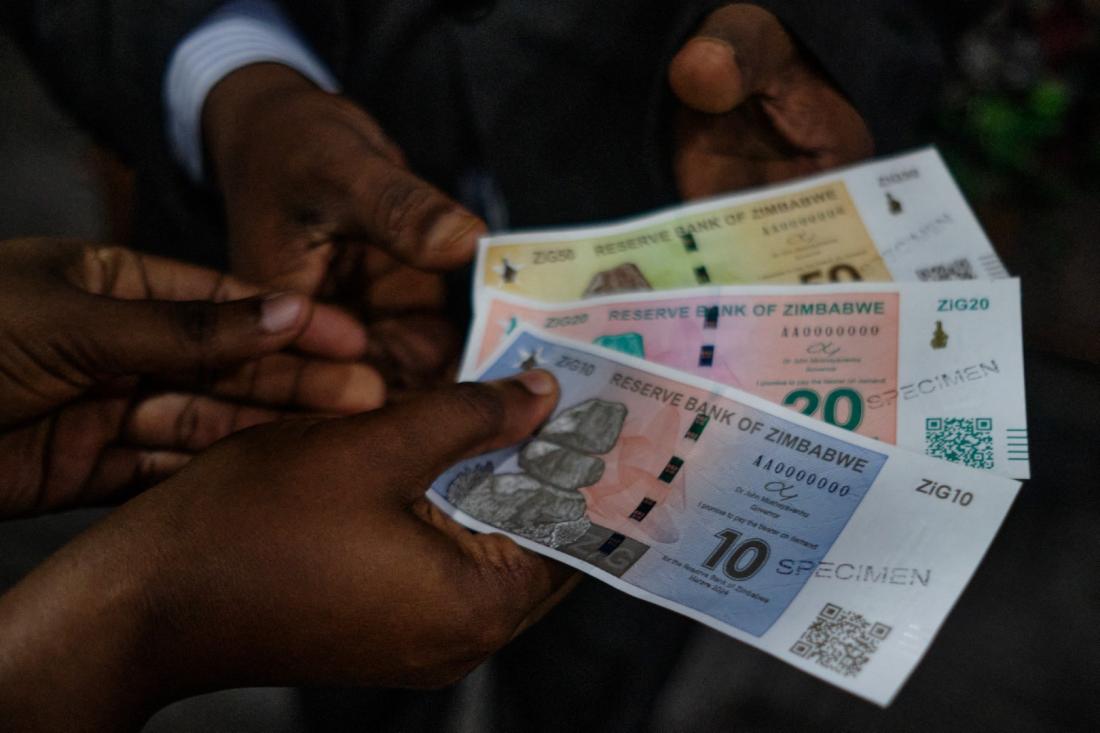
The Zimbabwean dollar, already of little value, became worthless overnight, frustrating citizens on April 9, 2024, who queued for hours outside banks attempting to withdraw their funds.
The Reserve Bank is set to distribute the new notes on April 30, 2024, weeks after it was launched.
This has doubled the cost of goods for locals as shop owners are only accepting US dollars or doubling prices if paid in Zimbabwean dollars (archived here).
On April 23, 2024, the Zimbabwe Stock Exchange All Share Index fell more than 99 percent following the introduction of the ZiG (archived here).
Local media also reported that 65 suspected money exchangers appeared in court on allegations of contravening the exchange control regulations (archived here).
The current security operation against illegal currency traders is succeeding. In Rusape, the unscrupulous currency speculators have disappeared from the pavements of major retailers where they have been operating from for years#ZiGpic.twitter.com/Echewd18Zm
— Ministry of Information, Publicity & Broadcasting (@InfoMinZW) April 25, 2024
Copyright © AFP 2017-2026. Any commercial use of this content requires a subscription. Click here to find out more.
Is there content that you would like AFP to fact-check? Get in touch.
Contact us
